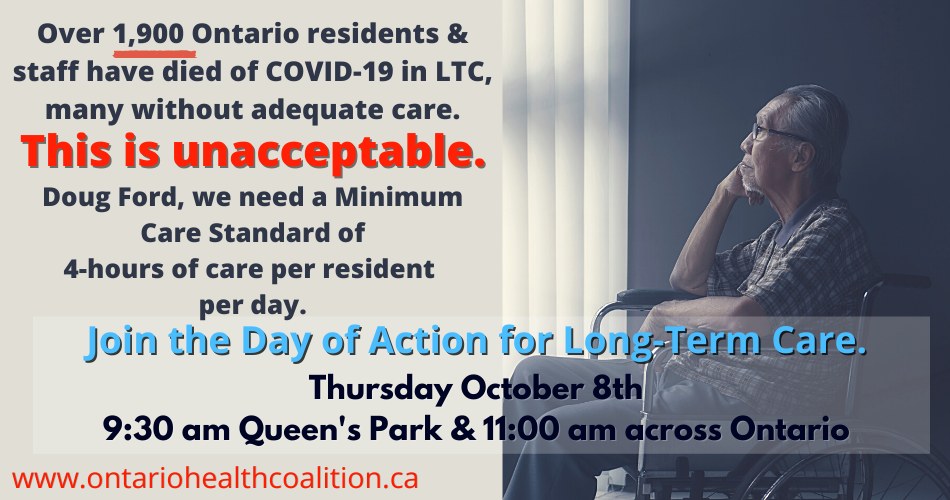Ontario Urgently Needs Money for Hospitals
Over the last week, the Ford government has rolled out a series of media announcements about healthcare funding and staffing. Today the Ontario Health Coalition issued the following statement to break down what has been announced, what it means, and whether it is enough.
“Hospitals are reporting across Ontario that have been promised their extraordinary COVID-19 pandemic costs will be funded, but much of the money has not flowed. Local hospitals are reporting deficits, some have lay offs, some are drawing down their cash reserves. Hospitals need not only their extraordinary costs, but also their lost revenues from the pandemic funded, and the Ford government needs to get the funding out the door post-haste,” said Natalie Mehra, executive director of the Ontario Health Coalition. “The same applies to the late and slow release of announced funding for long-term care homes. Our vital healthcare institutions need stability and certainty to build urgently needed capacity for healthcare services now.”
There are significant and urgent capacity issues that need to be addressed and the fall plan does not have any coherent strategy to do this. The Coalition is calling upon the Ford government to:
- Speed up the flow of funding that has been announced and promised to stabilize the healthcare sector and enable hospitals, long-term care homes and community care to develop urgently needed capacity.
- Provide adequate funding to hospitals and flow the money quickly to deal with extraordinary COVID-19 costs including assessment centres, laboratory testing, rapid response teams for long-term care homes, and others, as well as to cover lost revenues from the shut down in the first wave.
- Fund and resource teams, either from hospitals or in the community to help long-term care homes with outbreaks that they are not able to stop on their own. The threshold for intervention needs to be much lower than was evidenced in Ottawa where, only after 92 staff and residents had contracted COVID-19 and 11 had died, did the Chief Medical Officer of Health make an order. There needs to be a clear, systematic plan for such intervention early on, to save lives. The capacity issues are serious and must be addressed. For example, in Ottawa, the Ottawa Hospital is operating at over full capacity and is also needed to stabilize the long-term care homes in outbreak. Hospitals or community teams need a clear plan and resources immediately to create the capacity to deal with these crises. The number of larger outbreaks in long-term care is just beginning to go up again and this is urgent.
- Either staff needs to be provided to get care levels up in the homes, or residents need to be provided care in a field hospital or hospital (subject to their right to informed consent). Leaving residents without staff to feed, provide emotional support and all the basic care necessities cannot happen again.
- A real plan to recruit, train, and improve working conditions for PSWs is still urgently needed, and shortages of other vital staff including nurses, housekeeping, dietary, and rehab staff in long-term care must also be addressed. Strings must be attached to funding in this sector, that is majority for-profit, to ensure that funding goes to these improvements. A minimum care standard of an average of 4-hours per resident per day would ensure funding goes to improving actual care levels, provide adequate staffing, improve retention and improve outcomes. The Ford government did not announce any commitment to any minimum care standard.
Brief Analysis of the Funding/Staffing Announcements:
The staffing announcement overall for healthcare is 3,700 new staff. That is for all of healthcare and it seems to be more about PR than substance. It is not enough. A quick breakdown of the numbers in the government release:
- A $5,000 incentive to 2,000 recent graduates for a six-month commitment to work in LTC and home care. This is temporary and the numbers are inadequate.
- The number of infection control staff and “supportive care workers” (not PSWs) is less than 1 per home.
- $18-million for Ontario’s Nursing Graduate Guarantee program, which provides full-time salary and benefits for more than 600 nurses with a focus on recruiting in areas of need such as long-term care homes and acute care settings. That amounts to $30,000 a nurse. On the ground that may mean that some part time nurses will get full time hours.
- Up to $8-million to add more than 800 nurses to the health system in areas of need across the province. That amounts to $10,000 per nurse, obviously not enough to add 800+ nurses.
Hospitals
Ontario’s hospitals have long had operating rooms that are closed for weeks or months or even permanently due to inadequate funding, which is among the lowest in Canada. Additionally, hospitals have closed down thousands of beds even while suffering increased overcrowding. There is untapped capacity in hospital laboratories that could be running COVID-19 tests, unused capacity in hospital MRI and diagnostics. Funding is urgently needed to address the severe capacity problems and the backlog in surgeries and diagnostics. The Ontario Health Coalition is calling on the Ford government to fund public hospitals and flow the money to stabilize and build needed capacity. The amount announced so far ($283-million for surgical/diagnostic backlog) does not even address existing deficits.
Long-Term Care
$405-million announced for operating pressures due to COVID-19. This is a significant increase, though not enough to reach a safe level of care (4-hours on average per resident), there is a problem of late and slow flow of the announced funding, and it does not appear that strings are attached to ensure that the money goes to improving care. In long-term care the government announced $3 pay to replace the previous $4 pandemic pay bump up. There is an additional incentive for new grads to provide 2,000 recent graduates with 6-months of work, a handful of infection control staff and support workers (not PSWs).
The bottom line is that the Ford government’s approach is piecemeal, does not include a robust recruitment strategy and does not address the longstanding problems in working conditions. The Ford government’s approach is far less and far later than the program launched by the government of Quebec four months ago in which the province itself drove recruitment, hiring 10,000 PSWs (the Quebec equivalent), paying them for training and providing a wage of $26 per hour. B.C.’s government took action 6-months ago to provide a wage increase and full-time work in long-term care. There is no promise or requirement for long-term care homes to provide full-time work and benefits. Child care for workers is also a major problem in this sector and a barrier to recruitment. The pandemic pay is not enough to offset lost hours for staff who have had to give up part-time jobs in order to work in one long-term care home, a move that the Health Coalition supports, but with appropriate supports for the workers. Incentivizing new grads does not deal with the working conditions for existing staff who have toiled through the entire first wave. There is nothing to stop homes from hiring untrained staff, in fact, emergency orders enable them to do this, instead of providing full-time work for their existing PSWs and hiring trained PSWs.
Home and Community Care
$457-million to increase community capacity, including home and community care to help reduce pressure on the healthcare system and expand capacity. This is a significant increase. The government also announced $3 pay to replace the $4 pandemic pay. There are no details about this. There are severe staffing shortages in home and community care also. Home and community care continue to be used to offload hospital patients, sometimes without informed right to consent, in an attempt to deal with capacity pressures in hospitals. Home care continues to be deeply privatized, fragmented and rationed. There is no clear plan to address the issues. •






